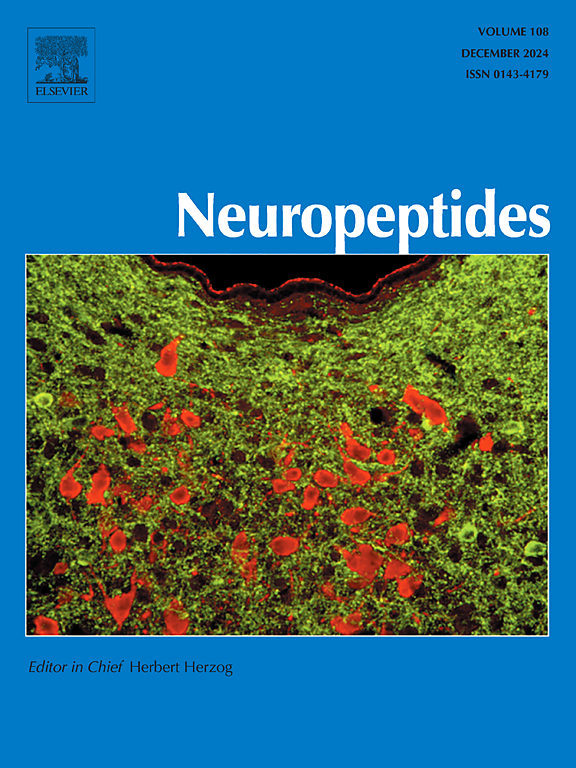Mechanistic role of proteins and peptides in Management of Neurodegenerative Disorders
IF 2.7
3区 医学
Q3 ENDOCRINOLOGY & METABOLISM
引用次数: 0
Abstract
Proteins and peptides have emerged as significant contributors in the management of neurodegenerative disorders due to their diverse biological functions. These biomolecules influence various cellular processes, including cellular repair, inflammation reduction, and neuronal survival, which are crucial for mitigating the effects of diseases such as Alzheimer's, Parkinson's, and Amyotrophic Lateral Sclerosis (ALS). By interacting with specific cellular receptors, proteins and peptides like neurotrophic factors, cytokines, and enzyme inhibitors promote neurogenesis, reduce oxidative stress, and enhance synaptic plasticity. Nevertheless, till certain limitations and challenges do exist to deliver these fragile therapeutic bioactives. Moreover, targeted delivery systems, such as nanoparticles and biomolecular carriers, are being developed to improve the bioavailability and specificity of these protein-based therapeutics, ensuring efficient crossing of the blood-brain barrier. This review explores the mechanistic pathways through which these biomolecules act, emphasizing their potential to modify disease progression and improve the quality of life in patients with neurodegenerative conditions. Overall, proteins and peptides are not only seen as promising therapeutic agents but also as foundational tools in advancing personalized medicine in the field of neurodegenerative disorders.
蛋白质和多肽在神经退行性疾病治疗中的机制作用
由于蛋白质和多肽具有不同的生物学功能,它们已成为神经退行性疾病治疗的重要贡献者。这些生物分子影响各种细胞过程,包括细胞修复、炎症减少和神经元存活,这对于减轻阿尔茨海默病、帕金森病和肌萎缩侧索硬化症(ALS)等疾病的影响至关重要。通过与特定的细胞受体、蛋白质和多肽如神经营养因子、细胞因子和酶抑制剂相互作用,促进神经发生,减少氧化应激,增强突触可塑性。然而,在提供这些脆弱的治疗性生物活性方面仍然存在某些限制和挑战。此外,正在开发靶向递送系统,如纳米颗粒和生物分子载体,以提高这些基于蛋白质的治疗方法的生物利用度和特异性,确保有效地穿过血脑屏障。这篇综述探讨了这些生物分子作用的机制途径,强调了它们在改变疾病进展和改善神经退行性疾病患者生活质量方面的潜力。总的来说,蛋白质和多肽不仅被视为有前途的治疗药物,而且是推进神经退行性疾病领域个性化医疗的基础工具。
本文章由计算机程序翻译,如有差异,请以英文原文为准。
求助全文
约1分钟内获得全文
求助全文
来源期刊

Neuropeptides
医学-内分泌学与代谢
CiteScore
5.40
自引率
6.90%
发文量
55
审稿时长
>12 weeks
期刊介绍:
The aim of Neuropeptides is the rapid publication of original research and review articles, dealing with the structure, distribution, actions and functions of peptides in the central and peripheral nervous systems. The explosion of research activity in this field has led to the identification of numerous naturally occurring endogenous peptides which act as neurotransmitters, neuromodulators, or trophic factors, to mediate nervous system functions. Increasing numbers of non-peptide ligands of neuropeptide receptors have been developed, which act as agonists or antagonists in peptidergic systems.
The journal provides a unique opportunity of integrating the many disciplines involved in all neuropeptide research. The journal publishes articles on all aspects of the neuropeptide field, with particular emphasis on gene regulation of peptide expression, peptide receptor subtypes, transgenic and knockout mice with mutations in genes for neuropeptides and peptide receptors, neuroanatomy, physiology, behaviour, neurotrophic factors, preclinical drug evaluation, clinical studies, and clinical trials.
 求助内容:
求助内容: 应助结果提醒方式:
应助结果提醒方式:


